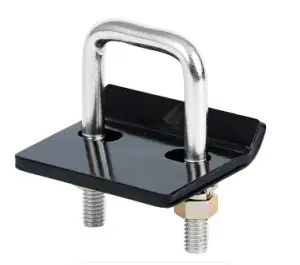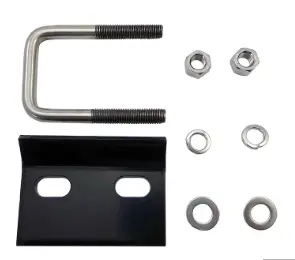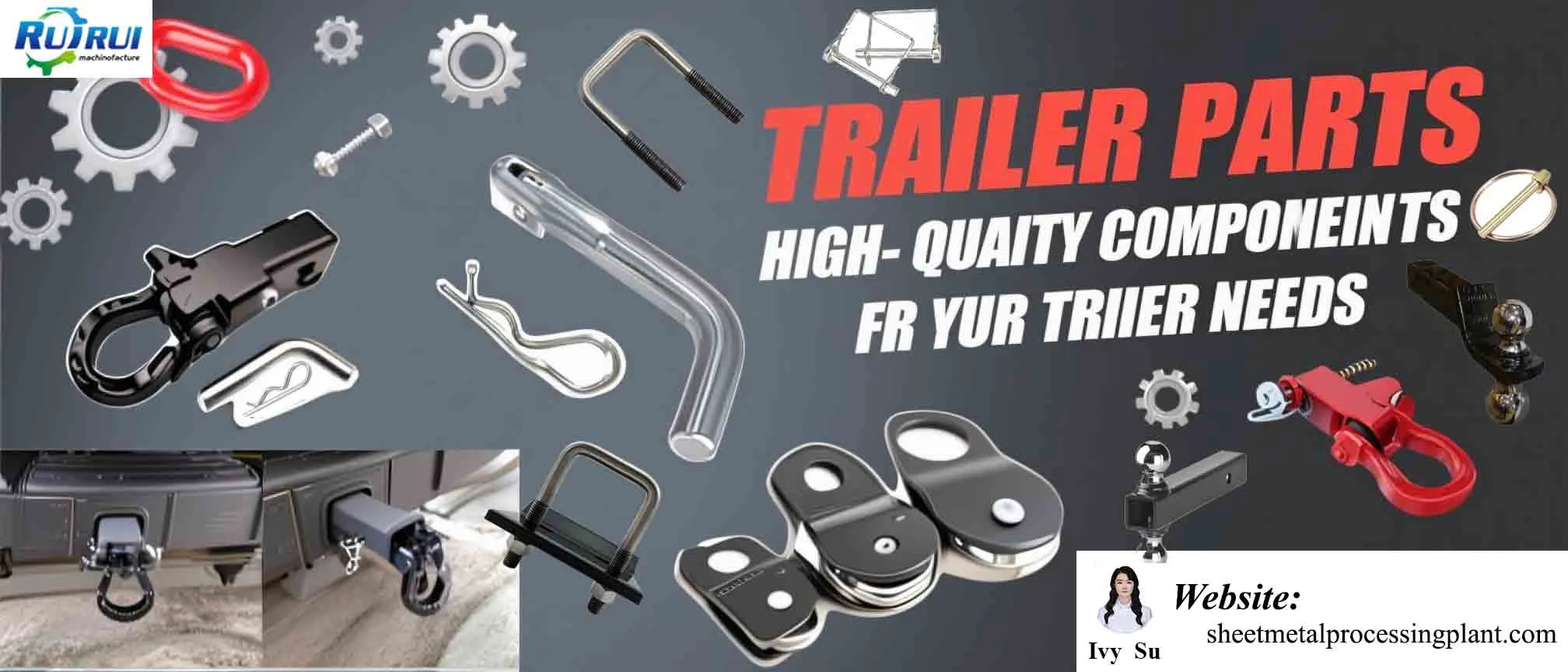Corrosion-Resistant Hitch Tightener: The Ultimate Solution for Rust-Free Towing
2025-11-11 10:54:32
Picture this: you're preparing for a critical delivery, hitching your loaded trailer in the early morning dampness. You reach for your hitch tightener only to find it seized with rust, threads corroded beyond use. This nightmare scenario costs businesses thousands in downtime and safety risks annually. A corrosion-resistant hitch tightener eliminates these concerns entirely, ensuring your towing equipment remains reliable season after season, regardless of weather conditions or road salt exposure. This specialized trailer hitch tightener represents the difference between smooth operations and costly roadside emergencies.

Understanding Corrosion-Resistant Hitch Tightener Technology
-
What Makes a Hitch Tightener Truly Corrosion-Resistant?
The secret behind an effective corrosion-resistant hitch tightener lies in advanced surface treatment technologies combined with superior base materials. Modern hitch tighteners employ multiple protective layers including galvanization and Dacro coating processes that create impermeable barriers against moisture, salt, and chemical exposure. Unlike conventional fasteners that rely on single-layer protection, premium corrosion-resistant hitch tighteners feature Grade 8 steel cores treated through electroplating and plastic spraying processes. These multi-stage treatments ensure that even when the outer layer experiences minor abrasion from regular use, underlying protective layers continue defending against oxidation. The manufacturing process involves precision CNC machining to maintain exact tolerances, followed by specialized coating applications that bond molecularly to the steel substrate, creating a unified protective system rather than simply a surface coating.
-
The Science Behind Rust Prevention in Trailer Applications
Trailer hitch tightener components face uniquely aggressive corrosive environments. Road spray contains not just water but dissolved salts, de-icing chemicals, and abrasive particles that accelerate deterioration. Standard fasteners fail because moisture penetrates microscopic surface irregularities, initiating electrochemical reactions that produce iron oxide. A properly engineered corrosion-resistant hitch tightener counters these threats through strategic material selection and treatment protocols. Stainless steel options provide inherent chromium oxide passivation layers, while galvanized steel versions sacrifice zinc coating to protect underlying metal. Advanced Dacro coating technology adds hexavalent-chromium-free protection that meets modern environmental standards while delivering superior performance. The dimensional stability achieved through precision manufacturing ensures consistent clamping force throughout the product lifecycle, preventing the loosening that allows moisture infiltration. Temperature cycling from winter cold to summer heat further challenges lesser fasteners, but quality corrosion-resistant designs maintain integrity across extreme temperature ranges from negative forty to positive one hundred twenty degrees Fahrenheit.
Critical Features That Define Premium Hitch Tightener Quality
-
Material Composition and Structural Engineering
Premium corrosion-resistant hitch tighteners utilize Grade 8 steel alloys specifically formulated for high-stress applications. This material specification ensures tensile strength exceeding 150,000 PSI, providing the clamping force necessary to secure heavy loads without yielding or deforming. The metallurgical composition includes controlled carbon content, manganese for hardenability, and trace elements that enhance fatigue resistance. Manufacturing begins with certified raw material sourcing, where incoming inspection verifies chemical composition and mechanical properties through spectrographic analysis and hardness testing. The forging or machining process creates grain structures aligned with stress vectors, maximizing strength while maintaining ductility. Thread profiles follow ISO 4032 specifications, ensuring compatibility with standard coupling systems while providing optimal load distribution. Customizable dimensions accommodate various trailer tongue sizes, typically ranging from two to two-point-five inches in diameter. The engineering considers not just static loading but dynamic forces encountered during acceleration, braking, and cornering, incorporating safety factors that exceed regulatory requirements.
-
Advanced Coating Systems for Extended Service Life
Surface treatment technology represents the crucial difference between ordinary and exceptional corrosion-resistant hitch tighteners. The galvanization process immerses components in molten zinc at temperatures exceeding 840 degrees Fahrenheit, creating metallurgical bonds that cannot flake or peel like paint. This sacrificial anode principle means the zinc corrodes preferentially, protecting underlying steel. Dacro coating provides an alternative approach using aluminum flakes and zinc in an inorganic binder, applied through dip-spin processes that ensure complete coverage including recessed areas and internal threads. This coating system delivers salt spray resistance exceeding 1000 hours in standardized testing, far surpassing conventional plating. Additional options include powder coating for aesthetic appeal and added protection, applied electrostatically and cured at controlled temperatures to achieve optimal adhesion and finish quality. The selection of coating type depends on application environment, with marine and heavy industrial users preferring Dacro systems while commercial transport operators might choose galvanized options for cost-effectiveness. Quality control during coating application includes thickness measurement, adhesion testing, and visual inspection to ensure complete coverage without defects.

Application-Specific Advantages Across Industries
-
Heavy-Duty Transportation and Fleet Management
Commercial trucking operations demand absolute reliability from every trailer component, making the corrosion-resistant hitch tightener essential equipment for maintaining uptime and safety compliance. Fleet managers recognize that a single fastener failure can cascade into hours of delay, missed deliveries, and potential accident liability. Modern logistics operations employ just-in-time delivery schedules where equipment failures disrupt entire supply chains. Corrosion-resistant hitch tighteners installed during routine maintenance cycles provide peace of mind through seasons of operation without replacement needs. The vibration resistance engineered into quality designs prevents the loosening common with standard fasteners subjected to highway speeds and rough road surfaces. DOT FMVSS 121 compliance ensures these components meet federal safety standards for air brake systems and coupling devices, critical for regulatory inspections. Fleet maintenance supervisors appreciate the reduced inventory requirements when standardizing on reliable corrosion-resistant hitch tightener options, as fewer emergency replacements mean lower carrying costs and simplified parts management.
-
Agricultural and Construction Equipment Applications
Agricultural trailers face particularly harsh conditions combining field dust, fertilizer chemicals, and seasonal moisture extremes that rapidly destroy unprotected fasteners. Harvest season demands present no tolerance for equipment failures during critical weather windows. Farmers investing in corrosion-resistant hitch tightener components protect their operational capability while reducing the frustration of seized fasteners during time-sensitive periods. Construction sites add cement dust, hydraulic fluids, and metal particulates to the corrosive mix, creating environments where standard hardware degrades within months. Equipment rental companies serving these industries recognize that durable fastener systems reduce maintenance interventions and equipment downtime, directly improving rental fleet profitability. The customization capabilities offered for specialized applications allow engineering solutions for unique trailer designs, unusual loading configurations, or extreme duty cycles. Whether securing heavy equipment haulers, agricultural implement trailers, or construction material carriers, properly specified corrosion-resistant fasteners deliver reliability that justifies their modest premium over conventional alternatives.
Manufacturing Excellence and Quality Assurance
-
Production Standards and Certification Compliance
Manufacturing corrosion-resistant hitch tighteners to professional standards requires sophisticated production capabilities and rigorous quality systems. ISO 9001 certification ensures documented processes govern every manufacturing stage from material receipt through final inspection. Quality management systems establish traceability connecting finished products to source materials, production parameters, and inspection records. Environmental management under ISO 14001 standards addresses the ecological impact of coating processes, ensuring compliant waste handling and emission controls. Occupational safety certifications protect workers while maintaining consistent production quality free from contamination or process variations. The integration of automated robotic production lines with skilled human oversight combines efficiency with craftsmanship, enabling high-volume manufacturing without sacrificing precision. Advanced CNC machining centers equipped with laser measurement systems verify dimensional accuracy within micron tolerances, ensuring perfect thread engagement and consistent clamping characteristics. Progressive stamping operations for certain components achieve production rates supporting large-scale orders while maintaining batch consistency. The marriage of traditional metalworking expertise with modern automation technology positions qualified manufacturers to meet demanding specifications for corrosion-resistant hitch tightener production.
-
Comprehensive Testing and Inspection Protocols
Quality assurance for corrosion-resistant hitch tighteners extends beyond visual inspection to include destructive and non-destructive testing methodologies. Incoming material inspection employs hardness testing, spectrographic analysis, and dimensional verification to confirm raw materials meet specifications. In-process checks during manufacturing monitor critical parameters including machining dimensions, coating thickness, and heat treatment results. Statistical process control techniques identify trending variations before they produce out-of-specification parts. Final testing subjects random samples from each production batch to proof load testing, verifying mechanical strength under simulated service conditions. Salt spray testing evaluates coating effectiveness, with chambers exposing samples to accelerated corrosion conditions equivalent to years of field service. Torque testing confirms proper thread engagement and clamping force characteristics. Metallurgical examination through microscopy reveals grain structure, coating adhesion, and material defects invisible to surface inspection. Compliance testing against ISO 4032 and DOT FMVSS 121 standards provides documentation supporting certification claims. This comprehensive quality control approach ensures every corrosion-resistant hitch tightener leaving the factory meets published specifications and performance expectations.
Customization Options for Specialized Requirements
-
Tailored Solutions for Unique Applications
The diversity of trailer applications demands flexibility in hitch tightener specifications, making customization capabilities essential for meeting specific operational needs. Standard catalog items serve common applications adequately, but specialized equipment often requires modified dimensions, materials, or coatings. Engineering collaboration begins with understanding the application environment, loading conditions, and operational constraints. Marine environments might necessitate stainless steel construction with additional protective coatings, while mining operations could require oversized components for heavy equipment trailers. Temperature extremes in refrigerated transport or desert operations influence material selection and coating choices. The ability to specify custom thread profiles, shank lengths, or head configurations ensures optimal fitment with existing trailer hardware. Coating selection balances corrosion protection requirements against aesthetic considerations, with options ranging from bright zinc plating for appearance to matte Dacro finishes for industrial applications. Volume considerations affect manufacturing approaches, with prototype quantities machined individually while production runs justify tooling investment for stamping or forging operations. Professional manufacturers maintain engineering teams capable of analyzing customer requirements, proposing solutions, and producing samples for testing before committing to full production runs.
-
Material and Finish Selection Guide
Choosing appropriate materials and finishes for corrosion-resistant hitch tighteners requires understanding the relationship between composition, treatment, and performance characteristics. Grade 8 steel provides excellent strength-to-cost ratio for most commercial applications, offering adequate corrosion resistance when properly coated. Stainless steel grades including 304 and 316 deliver superior inherent corrosion resistance suitable for marine or chemical exposure environments, though at significantly higher material costs. Coating selection balances protection level, environmental compliance, and budget constraints. Hot-dip galvanizing creates thick zinc layers ideal for severe outdoor exposure, though the rough surface finish may be undesirable for precision applications. Electrogalvanizing produces thinner, smoother coatings appropriate for moderate corrosion environments. Dacro systems excel in salt spray resistance while maintaining precise dimensions and smooth finishes. Powder coating adds color coding capabilities and additional protective layers, popular for commercial fleets establishing visual equipment management systems. The interaction between base material and coating technology determines ultimate performance, with some combinations producing synergistic protection exceeding either element alone. Consultation with experienced manufacturers helps navigate these choices, ensuring selected specifications align with actual service conditions and budget parameters.
Long-Term Value and Operational Benefits
-
Total Cost of Ownership Analysis
Evaluating corrosion-resistant hitch tighteners purely on initial purchase price overlooks the substantial lifecycle value these components deliver. Standard fasteners requiring replacement multiple times annually accumulate costs exceeding premium components lasting several years. Labor expenses for emergency roadside repairs or scheduled maintenance interventions dwarf fastener costs, making reliability the dominant economic factor. Downtime costs vary by industry but consistently represent the largest expense component, particularly for commercial operators where hourly vehicle rates exceed hundreds of dollars. Safety incident potential associated with fastener failures introduces liability exposure difficult to quantify but potentially catastrophic. Insurance implications and regulatory compliance considerations add further weight to reliability arguments. Fleet operators conducting total cost analysis consistently find that specifying quality corrosion-resistant hitch tighteners reduces annual fastener-related expenses by sixty to eighty percent compared to economy alternatives. The predictable service life enables maintenance planning during scheduled intervals rather than reactive emergency responses. Inventory carrying costs decrease when fewer replacement parts require warehousing. The combination of these factors creates compelling financial justification for premium fastener investments, particularly for operations managing multiple trailers or high-utilization equipment.
-
Maintenance Simplification and Operational Efficiency
Beyond direct cost savings, corrosion-resistant hitch tighteners contribute to operational efficiency through simplified maintenance protocols and enhanced equipment availability. Maintenance crews appreciate fasteners that remain serviceable throughout inspection intervals, enabling routine checks without struggling against seized threads or corroded surfaces. The consistent torque characteristics of quality fasteners facilitate proper installation using calibrated tools, ensuring appropriate clamping force without overtightening risks. Reduced maintenance attention allows reallocation of mechanic time to other critical systems, improving overall fleet condition. Standardizing on reliable fastener systems simplifies training for maintenance personnel, reducing errors and improving first-time fix rates. The predictable replacement intervals enable parts procurement planning that optimizes inventory levels and supplier relationships. Documentation of fastener specifications and replacement histories supports regulatory compliance efforts and provides evidence of proper maintenance practices. Equipment operators gain confidence knowing their trailers feature reliable coupling systems, reducing pre-trip inspection anxiety and improving driver satisfaction. The operational peace of mind delivered by proven corrosion-resistant components contributes to overall business success through multiple pathways beyond simple fastener performance.

Conclusion
Corrosion-resistant hitch tighteners represent critical safety and reliability investments for any towing operation, delivering rust-free performance that protects equipment and prevents costly failures across demanding applications and environments.
Cooperate with Qingdao RUIRUI Machinery Co., LTD.
As a leading China Corrosion-Resistant Hitch Tightener manufacturer, China Corrosion-Resistant Hitch Tightener supplier, and China Corrosion-Resistant Hitch Tightener factory, Qingdao RUIRUI Machinery Co., LTD offers China Corrosion-Resistant Hitch Tightener wholesale with competitive Corrosion-Resistant Hitch Tightener price. Our High Quality Corrosion-Resistant Hitch Tightener products are now Corrosion-Resistant Hitch Tightener for sale globally. Since 2016, we've specialized in trailer components with ISO certifications and advanced manufacturing capabilities including stamping, CNC machining, laser cutting, and comprehensive coating processes. Our eight production lines deliver 130,000 annual pieces with fully automated robot systems. We serve over 80 countries with OEM support, customization services, and just-in-time delivery. Contact us at info@qdkshd.com for technical specifications, custom solutions, and partnership opportunities. Save this resource for future reference when sourcing reliable towing components.
References
1. "Corrosion Protection Methods for Automotive Fasteners in Harsh Environments" - Society of Automotive Engineers Technical Paper Series, Materials Engineering Division
2. "Galvanizing and Alternative Coating Systems for Steel Components: Performance Comparison Study" - American Galvanizers Association Research Committee
3. "Federal Motor Vehicle Safety Standards: Coupling Devices and Towing Systems Requirements" - National Highway Traffic Safety Administration, U.S. Department of Transportation
4. "Metallurgical Considerations in High-Strength Fastener Manufacturing" - American Society for Testing and Materials, Committee on Fasteners
Send Inquiry
You may like
